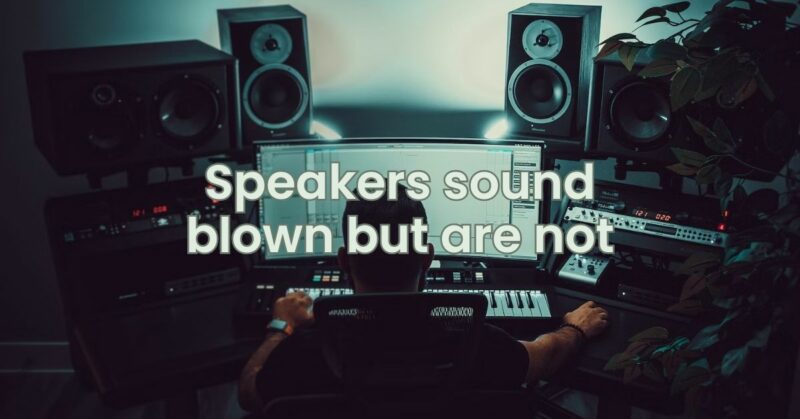It can be very frustrating when your speakers start to sound blown, even though they are not physically damaged. This can happen for a variety of reasons, but it is usually caused by a problem with the speaker’s internal components.
Here are some of the reasons why your speakers might sound blown even though they are not:
- Coil rub: This is a common problem that can occur in speakers with moving parts. When the coil rubs against the speaker cone, it can create a buzzing or rattling noise that sounds like a blown speaker.
- Voice coil damage: The voice coil is the part of the speaker that moves the speaker cone. If the voice coil is damaged, it can cause the speaker to sound distorted or even blown.
- Speaker cone damage: The speaker cone is the part of the speaker that vibrates to create sound. If the speaker cone is damaged, it can cause the speaker to sound distorted or even blown.
- Excessive heat: Speakers can overheat if they are used at high volumes for extended periods of time. This can cause the speaker’s internal components to warp or melt, which can lead to a blown speaker sound.
If your speakers sound blown but are not, there are a few things you can do to try to fix the problem.
- Check for coil rub: You can check for coil rub by listening for a buzzing or rattling noise coming from the speaker. If you hear this noise, you can try to fix it by lubricating the speaker cone or by replacing the speaker.
- Check for voice coil damage: You can check for voice coil damage by looking for cracks or tears in the voice coil. If you see any damage, you will need to replace the speaker.
- Check for speaker cone damage: You can check for speaker cone damage by looking for tears or cracks in the speaker cone. If you see any damage, you will need to replace the speaker.
- Reduce the volume: If you have been using your speakers at high volumes, try reducing the volume. This will help to prevent the speakers from overheating and causing damage.
- Give the speakers a break: If you have been using your speakers for extended periods of time, give them a break. This will allow the speakers to cool down and prevent damage.
If you have tried all of the above solutions and you are still having problems, you may need to take your speakers to a qualified technician for further diagnosis and repair.
Here are some additional tips that can help you prevent your speakers from sounding blown even though they are not:
- Use the right speakers for your sound system: Not all speakers are created equal. Some speakers are designed for high volumes, while others are designed for more moderate listening levels. Make sure to choose speakers that are rated for the power output of your sound system.
- Don’t turn up the volume too high: This is the most common cause of speaker blowouts. When you turn up the volume too high, you are overloading the speakers and forcing them to work beyond their limits. This can cause the speakers to overheat and eventually fail.
- Have your speakers serviced regularly: If you use your speakers regularly, it is a good idea to have them serviced by a qualified technician every few years. This will help to ensure that they are in good condition and that they are not at risk of blowing out.
By following these tips, you can help to prevent your speakers from sounding blown even though they are not and extend their lifespan.


